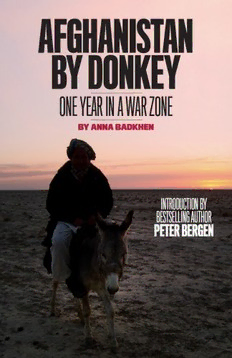
Afghanistan by Donkey: One Year in a War Zone PDF
Preview Afghanistan by Donkey: One Year in a War Zone
AFGHANISTAN BY DONKEY ONE YEAR IN A WAR ZONE BY ANNA BADKHEN INTRODUCTION BY BESTSELLING AUTHOR PETER BERGEN © 2012 Foreign Policy Published by The FP Group, a division of The Washington Post Company In partnership with the www.foreignpolicy.com AFGHANISTAN BY DONKEY ONE YEAR IN A WAR ZONE BY ANNA BADKHEN PREFACE BY BESTSELLING AUTHOR PETER BERGEN Edited by Britt Peterson and Susan B. Glasser Photographs by Thorne Anderson and Javier Manzano Art-directed by Dennis Brack with assistance from Erin Aulov i ANNA BADKHEN • AFGHANISTAN BY DONKEY III. SUMMER 16. Bombs in Mazar: Mazar-e-Sharif, Balkh Province 64 17. The Taliban Are Here. Does It Matter?: Karaghuzhlah, Balkh Province 67 18. A Minuteman’s War: Shahraq, Balkh Province 71 19. Praying for Change: Kampirak, Balkh Province 74 20. The Drought: Karaghuzhlah, Balkh Province 77 21. The Cruel Way: Dasht-e-Shor Road, Balkh Province 80 IV. FALL TO WINTER 22. War’s Off-Season: Karaghuzhlah, Balkh Province; Andkhoi, Faryab Province 84 23. Crime Scene: Mazar-e-Sharif, Balkh Province 87 24. Outside the Frame: Oqa, Balkh Province 90 25. Written on the Body: Jalalabad, Nangarhar Province 93 Acknowledgements 105 About the Author 106 iv ANNA BADKHEN • AFGHANISTAN BY DONKEY PREFACE BY PETER BERGEN IF YOU CAN’T UNDERSTAND A COUNTRY just from looking at the cities, you certainly can’t understand a war just from reading about the battles. A decade after the fall of the Taliban, as the Afghan war spread alarmingly from the south and the east of the country into what had hith- erto been the relatively peaceful provinces of Northern Afghanistan, Anna Badkhen spent a year embedded not with NATO forces but with the rural population of the often ignored north. She did this at considerable personal risk, traveling alone to villages and cities to deliver a story that has rarely been told by Western journalists. The Afghans who hosted Badkhen on her remarkable journey rep- resent millions in the country who have seen not a cent of the tens of billions of dollars lavished on Afghanistan by the United States and its allies since 2001. Their lives are deeply scarred by three decades of war: As Badkhen reports, two out of three Afghans are in the grips of what the West would term post-traumatic stress disorder. Badkhen focuses in particular on the hamlet of Oqa, whose inhabit- ants are illiterate and unaware of the 9/11 attacks. Without access to education or modern medicine, they toil like medieval peasants, gath- ering tumbleweed to use as fuel for fires in the nearest town. Badkhen shares in their weddings and funerals, observes their children growing addicted to the opium that is their cure-all, and documents their lives of quiet desperation, as they try to eke out a semblance of existence from the harsh desert soil. She describes this all with a painterly evo- vi ANNA BADKHEN • AFGHANISTAN BY DONKEY cation of place that recalls Brueghel’s darkest portraits of rural life in sixteenth-century Holland. Most ominously, Badkhen observes the steady advance of the Taliban— young men wearing turbans and riding motorcycles—who take over village after village without firing a shot because the Afghan security forces are spread too thin or are too feckless to halt the rising Taliban tide. Once in power, the Taliban install their ultra-fundamentalist interpretation of sharia law. They even take over Badkhen’s beloved hamlet of Oqa. It’s a bleak tale told by an expert storyteller that should give pause to those—like myself—who had hoped for an Afghan future in which the Tal- iban were completely marginalized and ordinary Afghans could hope for some modicum of a better life. In much of northern Afghanistan Badkhen has shown us that this is as much of a pipe dream as the opium smoke that is the only solace of the men, women, and children of the village of Oqa. Peter Bergen, a director of the New America Foundation and frequent visitor to Afghanistan since 1993, is the author of The Longest War: The Enduring Conflict between America and al-Qaeda and the forthcoming Manhunt: The Ten-Year Search for bin Laden. vii ANNA BADKHEN • AFGHANISTAN BY DONKEY Maybe there are no fields other than battlefields, those still remembered, and those long forgotten, birch woods and cedar woods, snows and sands, iridescent swamps, and ravines of dark defeat. — Wislawa Szymborska, Reality Demands viii
